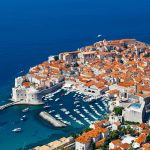August 14, 2019 – A new project sets out to make Croatia a gastronomic icon of Europe.
Earlier this year, in collaboration with WYG Counseling, the Institute for Tourism and the Institute for Development and International Relations, a major project was completed entitled “Croatia, the New Gastronomic Icon of Europe: A Strategy for the Development of Gastronomy, Gourmet, and Gastronomic Tourism in Croatia with an Action Plan 2019 – 2022,” reports HRTurizam.
TCN’s Mario Jukić was at the closing conference of the Gourmet Croatia project back in March, held at the Principovac estate near the easternmost Croatian town of Ilok. There, Neven Ivandić and Neda Telišman Košuta from the Institute of Tourism presented the project and the brochure “Croatia – the New Gastronomic Icon of Europe”.
The overall objectives of the project are to link the food processing sector and the tourism sector through establishing local production systems, as well as the territorial branding of Croatia as a recognizable gourmet destination, or, more precisely, a gastronomic destination that enters the top 20 tourist destinations in the world. The strategic document analyzes the current state of gastronomy and gourmet offerings in Croatia, the main market trends in the field of eno-gastronomy, defines the vision of the development of Croatian gastronomy and “gourmet” and is complete with an action plan. The project is co-financed by the European Regional Development Fund.
Interestingly, the contracting authority of the strategy, which is several thousand pages long and has been reportedly working for three years, is the Ministry of Economy, Entrepreneurship and Crafts, not the Ministry of Tourism, which should be responsible for implementing the Action Plan.
The Ministry of Economy, Entrepreneurship, and Crafts turned out to be a mediator between the tourism and agriculture sectors in another story about the merger of the ‘green and blue Croatia’. The strategic brochure states that catering in Croatia is an industry that is developing faster than the economy as a whole, with a growing number of facilities and employees, as well as an increase in revenue and profit in 2016-2018.
However, at the conference back in March, Rudolf Štefan, the chef of the Pelegrini restaurant, spoke about the development of education in the gourmet area. “There are about sixty catering schools in Croatia, huge resources are being spent, but unfortunately, not all of these schools produce good staff. We need one high-quality institution that will create the foundations for high-quality gastronomic future of Croatia.”
Thus, the project brochure explains that the growth of interest in food and beverages reflects profound social changes driven by the improvements in education and prosperity, technology and growing environmental pollution, while the key trends for the development of global gastronomy are experience in buying, sustainability, healthy food, multiculturalism, return to tradition, good-quality fast food and growing media influence. That is the framework that supports further development of gastronomy and gastronomic tourism in the direction of creativity, authenticity and sustainability, concluded Jukić about the project in March.
To read more about travel in Croatia, follow TCN’s dedicated page.









